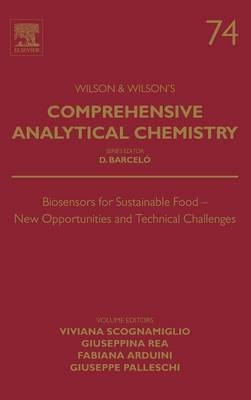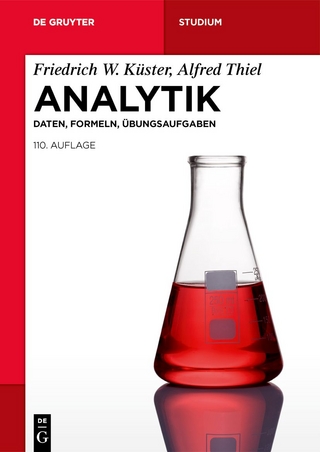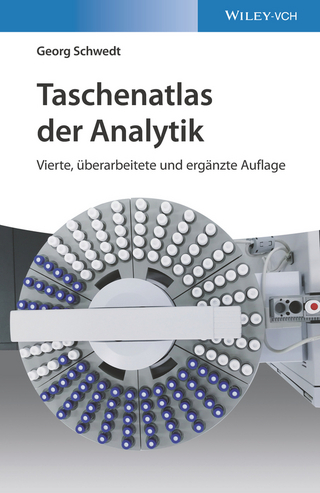
Biosensors for Sustainable Food - New Opportunities and Technical Challenges
Elsevier Science Ltd (Verlag)
978-0-444-63579-2 (ISBN)
Food production and consumption have a strong impact on the environment in terms of greenhouse gas emissions, water, and soil contamination, the reduction of arable land, water consumption, and many other factors, which in turn, negatively affect human health. These issues have consequences for economic development, too.
To address these challenges, it is necessary for scientists with different expertise, policymakers, and economists work together to develop new smart technologies and introduce them to the market, along with adequate regulations. In this regard, a sustainable food production system can be thought of as a chain of procedures with a low impact on the environment that guarantees a secured supply of healthier and fortified food while supporting economic growth.
Viviana Scognamiglio, a Molecular Biologist with a PhD in Industrial Biotechnology, is researcher at the National Research Council (CNR) in Rome, Italy. She has worked in research institutions and R&D companies, cooperating in several national and international projects dedicated to the development of biosensors for agrifood, environmental and biomedical application. She has experience in biochemistry and biophysics for the structural and functional characterisation of natural and synthetic biological entities for biosensing application, as well as for binding studies and interaction dynamics of macromolecules. She collaborated within Italian / European founded programmes such as Sensbyosin (FP7), Multibioplat (Eurotransbio), Multitask, BEEP-C-EN, Microbiosis, COST Action PHOTOTECH. She is author of 26 articles published in international scientific journals in the "peer reviewed", 4 book chapters, 15 oral presentations and 50 abstracts at national and international conferences.https://www.researchgate.net/profile/Viviana_Scognamiglio/ Giuseppina Rea, PhD in Biology, is researcher at the National Research Council (CNR) in Rome, Italy, and has experience in plant molecular biology, biochemistry, biotechnology and protein engineering applied to fundamental research and technological transfer. She leads the CNR institutional project AG.P01.011 Biotechnological applications of oxygenic photosynthetic organisms in the agro-food field: nutraceutics, biosensors and space biochips. She has scientific responsibility forf European / Italian founded programmes such as SENSBYOSIN (FP7), MULTIBIOPLAT (EUROTRANSBIO), BIOKIS-PHOTOEVOLUTION (ESA-ASI-NATO), COST Action PHOTOTECH: Photosynthetic proteins for biotechnological applications: biosensors and biochips. She is Member of the Scientific Committee of the Italian Platform in Organic Farming, PTBio Italia.https://www.researchgate.net/profile/Giuseppina_Rea/ Fabiana Arduini, PhD in Chemistry, is researcher at University “Tor Vergata in Rome, Italy. She is involved in the realisation of enzyme-based electrochemical biosensors, analytical methods based on enzyme inhibition, sensors based on different materials (glassy carbon, graphite, nanotubes, graphite inks) and mediators, and their application in clinical, agrifood and environmental fields. She is author of 38 articles published in international scientific journals in the "peer reviewed ", 7 book chapters, 3 Proceeding, 73 oral presentations or posters at conferences national and international. She collaborated within Italian / European founded programmes such as Leonardo RO/02/B/F/PP-141004, Biocop, EU Ocean 2013, ACQUA-SENSE (MI01_00223), Grape Health Wine (MI01_00308), APTAMERI BW (CIG 5411905D46).https://www.researchgate.net/profile/Fabiana_Arduini/ Giuseppe Palleschi, has been the Head of the Department of Chemical Science and Technology of the University of Rome “Tor Vergata since 1994. In 2000 he obtained the Laurea Honoris Causa from the University of Bucharest for his activity in the area of chemical sensors for food and environmental control. Prof. Palleschi’s research over the last 25 years has focused on the development of chemical sensors as well as bio- and immunosensors for use in the areas of biomedicine, food and environmental analysis. He is the author of more than 200 papers in international scientific journals and has served as coordinator of EU research projects, such as FAIR n.CT96 PL1092, INTAS 00-273, INCO ERB IC98 0906, QLK1-CT-2001-01617, EU Ocean 2013; and as collaborator of EU research projects, such as FAIR n. CT96 PL1095, INCO ERB IC98 0119, INCO ERB IC96 0804, EVK4-CT2000-00028, HPRN-CT-2002-00186, SSA.6FP INCO-ct-2004-003356, IP 6FP FOOD-CT-2004-06988.https://www.researchgate.net/researcher/39594668_Giuseppe_Palleschi/
1. Biosensor Potential in Pesticide MonitoringRiccardo Rapini and Giovanna Marrazza2. Trends on Biosensing Systems for Heavy Metal DetectionNeelam Verma and Gagandeep Kaur3. Sensing of Biological Contaminants: Pathogens and ToxinsNuvia Maria Saucedo and Ashok Mulchandani4. Biosensor-Based Technologies for the Detection of Pathogens and ToxinsKara L.M Moran, Jenny Fitzgerald, Daniel A. McPartlin, Jonathan H. Loftus and Richard O’Kennedy5. Biosensor to Ensure Food Security and Environmental ControlGennady A. Evtugyn6. Aptamers as Synthetic Receptors for Food Quality and Safety ControlRebeca Miranda-Castro, Noemí de-los-Santos-Álvarez and María Jesús Lobo-Castañón7. Emerging Nanomaterials for Analytical DetectionGeorgina Alarcon-Angeles, Giaan Arturo Álvarez-Romero and Arben Merkoçi8. Bio-Compatible Integration of Electronics into Food SensorsLiviu Mihai Dumitru, Mihai Irimia-Vladu and N. S. Sariciftci9. Food Microfluidics BiosensorsMiguel A. López, María Moreno-Guzman, Beatriz Jurado and Alberto Escarpa10. Commercially Available (Bio)Sensors in the Agrifood SectorAmina Antonacci, Fabiana Arduini, Danila Moscone, Giuseppe Palleschi and Viviana Scognamiglio11. Laser Scanning Approaches for Crop MonitoringDirk Hoffmeister12. Robotic Based Agriculture for Rural Renaissance: Drones and BiosensorsKulandaivel Chellappan Siva Balan13. Intelligent Food PackagingSemih Otles and Buket Yalcin Sahyar14. (Bio)Sensor Integration with ICT Tools for Supplying Chain Management and Traceability in AgricultureMimoza Durresi
| Erscheinungsdatum | 19.09.2016 |
|---|---|
| Reihe/Serie | Comprehensive Analytical Chemistry |
| Verlagsort | Oxford |
| Sprache | englisch |
| Maße | 152 x 229 mm |
| Gewicht | 600 g |
| Themenwelt | Naturwissenschaften ► Chemie ► Analytische Chemie |
| Technik ► Lebensmitteltechnologie | |
| ISBN-10 | 0-444-63579-3 / 0444635793 |
| ISBN-13 | 978-0-444-63579-2 / 9780444635792 |
| Zustand | Neuware |
| Haben Sie eine Frage zum Produkt? |
aus dem Bereich


